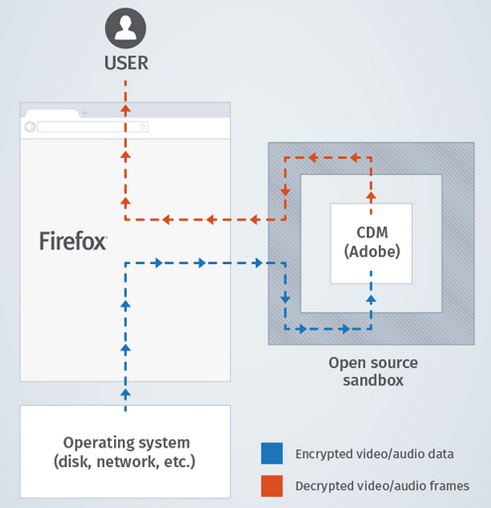Mozilla begrudgingly decides to adopt Adobe's DRM

Like it or not, a new era of DRM began on the internet overnight. Mozilla, the last major holdout to the W3C's endorsed DRM extensions known as Encrypted Media Extensions (EME), reluctantly decided to reverse its previous position and implement EME in the desktop versions of Firefox.
"We have come to the point where Mozilla is not implementing the W3C EME specification means that Firefox users have to switch to other browsers to watch content restricted by DRM," wrote Mozilla's new CTO Andreas Gal in a blog post.
"Mozilla would have preferred to see the content industry move away from locking content to a specific device (so called node-locking), and worked to provide alternatives."
To implement its DRM solution, the browser maker has teamed up with Adobe to provide a Content Decryption Module (CDM) — unlike the rest of Mozilla's codebase, the CDM has a proprietary licence. Rather than directly loading the CDM, Mozilla have decided to place the CDM in an open source sandbox, and removed permissions for the CDM to access a user's hard drive or network. The only data passed to the CDM will be decoding DRM-wrapped data, with the CDM returning its frame results for display to the user.

Gal said that the sandbox, rather than provide a single unique identifier for one browser, would pass a different identifier for each site.
"This sandbox-generated unique identifier allows the CDM to bind content to a single device as the content industry insists on, but it does so without revealing additional information about the user or the user’s device," he said.
"In addition, we vary this unique identifier per site (each site is presented a different device identifier) to make it more difficult to track users across sites with this identifier."
Mozilla will not be bundling the CDM with Firefox, instead the browser will download the CDM from Adobe and be activated after asking the user for permission to run.
"Our integration with the Adobe CDM will let Firefox users access this content while trying to maximize transparency and user control within the limits of the restrictions imposed by the content industry," said Gal.
"While we would much prefer a world and a Web without DRM, our users need it to access the content they want."
Mozilla's decision was slammed in a stinging rebuke issued by the Electronic Frontier Foundation (EFF).
"It's official: the last holdout for the open web has fallen," the EFF said. "Flanked on all sides by Google, Microsoft, Opera and (it appears) Safari's support and promotion of the EME DRM-in-HTML standard, Mozilla is giving in to pressure from Hollywood, Netflix et al, and will be implementing its own third-party version of DRM."
The EFF said that DRM does not prevent infringement, and instead becomes a pain point for browser makers.
"It reduces the security of our devices, reduces user trust, makes finding and reporting of bugs legally risky, eliminates fair use rights, undermines competition, promotes secrecy, and circumvents open standards," the EFF said.
"The fact that Mozilla, in opposition to its mission, had to prepare and design this feature in secret without being able to consult the developers and users who make up its community is an indication of how much of a contradiction DRM is in a pro-user open-source browser."
The EFF said that the DRM genie is now out of the bottle, and that although Mozilla believes it cannot change the industry's view on DRM, but moving to implement it, it has changed the industry.
"It is these repeated compromises to the needs of DRM advocates by tech company after tech company that are changing the nature of personal computing, transforming it into a sector that is dominated by established interests and produces locked-down devices, monitored and managed by everyone but their users."
The Encrypted Media Extensions (EM) is already bundled with the browsers distributed by Microsoft, Opera, Google, and Apple.
The EME have led a controversial life from their inception, with Dr Jeff Jaffe, CEO of the web standards body W3C, saying in June last year that if DRM were rejected then there was the chance that content owners would remove their content from the internet. Despite the protests of a number of organisations, the W3C decided to include EME into its specifications.